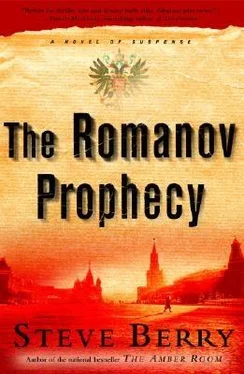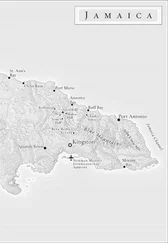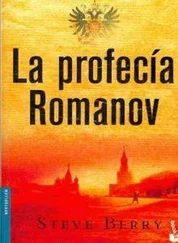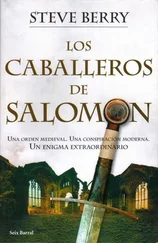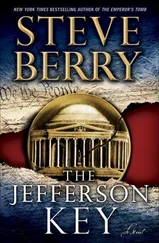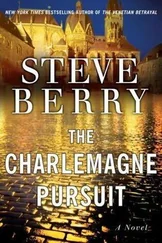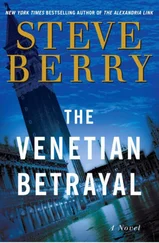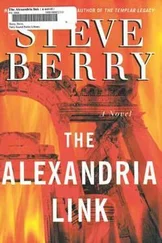Steve Berry - The Romanov Prophecy
Здесь есть возможность читать онлайн «Steve Berry - The Romanov Prophecy» весь текст электронной книги совершенно бесплатно (целиком полную версию без сокращений). В некоторых случаях можно слушать аудио, скачать через торрент в формате fb2 и присутствует краткое содержание. Жанр: Триллер, на английском языке. Описание произведения, (предисловие) а так же отзывы посетителей доступны на портале библиотеки ЛибКат.
- Название:The Romanov Prophecy
- Автор:
- Жанр:
- Год:неизвестен
- ISBN:нет данных
- Рейтинг книги:4 / 5. Голосов: 1
-
Избранное:Добавить в избранное
- Отзывы:
-
Ваша оценка:
- 80
- 1
- 2
- 3
- 4
- 5
The Romanov Prophecy: краткое содержание, описание и аннотация
Предлагаем к чтению аннотацию, описание, краткое содержание или предисловие (зависит от того, что написал сам автор книги «The Romanov Prophecy»). Если вы не нашли необходимую информацию о книге — напишите в комментариях, мы постараемся отыскать её.
The Romanov Prophecy — читать онлайн бесплатно полную книгу (весь текст) целиком
Ниже представлен текст книги, разбитый по страницам. Система сохранения места последней прочитанной страницы, позволяет с удобством читать онлайн бесплатно книгу «The Romanov Prophecy», без необходимости каждый раз заново искать на чём Вы остановились. Поставьте закладку, и сможете в любой момент перейти на страницу, на которой закончили чтение.
Интервал:
Закладка:
Dmitry Yakovlev was the mafiya's representative in the Secret Chancellory. In his midforties, with a shock of corn-colored hair spilling over a tanned brow, the man radiated charm and control. For once, the three hundred or so gangs that occupied western Russia had all agreed on a single envoy to represent their mutual interests. Too much was at stake to argue over protocol. The criminal element apparently understood survival, and well knew what an absolute monarch with the full support of the people could do for them. Or to them.
In many ways, Hayes realized, Stalin was the center of everything. Gang influence reached deep into the government, business, and the military. Russians even had a name for it: Vori v Zakone-Thieves in Law-a description Hayes liked. But their threat of violence was real since a contract killing was a far cheaper and faster way to settle a dispute than the courts.
"How was the opening session?" Stalin asked in perfect English.
"The commissioners organized themselves, as expected. They'll get down to business tomorrow. The timetable is six days to a first vote."
The Russian seemed impressed. "Less than a week was what you predicted."
"I told you I know what I'm doing. Was the transfer made?"
There was a hesitation that signaled irritation. "I am unaccustomed to such directness."
What was not said, but nonetheless clear, was that he was unaccustomed to such directness from a foreigner. Hayes decided to employ tact, though he, too, was irritated. "No disrespect intended. It's only that the payments have not been made, as agreed, and I'm accustomed to arrangements being honored."
On the table was a sheet of paper. Stalin slid it across to him. "That's the new Swiss account in Zurich you requested. Same bank as before. Five million, U.S., went in this morning. That's all the payments due to date."
Hayes was pleased. For a decade he'd represented the mafiya in their American diversifications. Millions of dollars had been laundered through North American financial institutions, most funneled into legitimate businesses seeking capital, more used to purchase stocks, securities, gold, and art. Pridgen amp; Woodworth had earned millions in legal fees through his representation, all made thanks to a combination of friendly American laws and even friendlier bureaucrats. No one knew the money source and, to date, the activity had not attracted any official attention. Hayes had used his representation to expand his influence in the firm and attract a huge array of foreign clients that turned to him simply because he understood how business was done in the new Russia-how to use fear and anxiety-how uncertainty could be a friend if one knew precisely how to alleviate it. Which he did.
Stalin smirked. "This is becoming quite profitable for you, Taylor."
"I told you I wasn't going to take the risks for my health."
"Apparently not."
"What was all that about yesterday? What you said about expanding my role in this whole affair."
"Just as I said. We may need certain matters handled and you come with a measure of deniability."
"I want to know what you're not telling me."
"It is truly not important at the moment. There is no need for concern; we are simply being cautious."
Hayes reached into his trouser pocket and withdrew the card Stalin had given him the day before. "Will I need to make the call?"
Stalin chuckled. "Does the notion of such loyalty-that on your order men would submerge themselves in the river-appeal to you?"
"I want to know why I might need them."
"Let us hope you won't. Now tell me about the power concentration. What was mentioned today at the session?"
He decided to let the matter drop. "Power will be concentrated in the tsar. But there will still be a council of ministers and a Duma that will have to be dealt with."
Stalin pondered the information. "It seems our nature to be volatile. Monarchy, republic, democracy, communism… none of it really works here." He paused, then added with a smile, "Thank goodness."
Hayes asked what he really wanted to know, "What of Stefan Baklanov? Will he cooperate?"
Stalin glanced at his watch. "I assume you will have the answer to that question shortly."
ELEVEN
GREEN GLADE ESTATE 4:30 PM
Hayes admired the shotgun, a fox side-by-side with a turkish walnut stock, hand-rubbed to an oil finish. The pistol grip was lean and straight with a beavertail fore-end and hard rubber butt plate. He tested the action, boxlike, with automatic ejectors. He knew the price ranged from seven thousand dollars for a basic model to twenty-five thousand for an exhibition-grade. Truly, an impressive weapon.
"Your shot," Lenin said.
Hayes shouldered the gun and took aim into a cloudy afternoon sky. He steadied the barrel with a feather-light touch.
"Pull," he yelled.
A clay pigeon shot from the thrower. He followed the black dot in the sight, moved ahead, and fired.
The target disintegrated in a shower of debris.
"You're a good shot," Khrushchev said.
"Hunting is my passion."
He spent at least nine weeks a year traveling the world on expeditions. Canadian caribou and geese. Asian pheasant and wild sheep. European red stag and fox. African Cape buffalo and antelope. Not to mention the duck, deer, grouse, and wild turkey he routinely sought in the woods of northern Georgia and the mountains of western North Carolina. His office in Atlanta was littered with trophies. The past couple of months had been so intense that he'd not had a chance to shoot, so he was grateful for this outing.
He'd left Moscow right after his meeting with Stalin, a car and driver delivering him to an estate thirty miles south of town. The manor house was a lovely red brick veined with ivy. It was owned by another member of the Secret Chancellory-Georgy Ostanovich, better known to Hayes as Lenin.
Ostanovich came from the military. He was a thin, cadaverous man with steel-gray eyes encircled by thick-lensed glasses. He was a general, though he never wore a uniform, a line officer who'd led troops in the assault of Grozny at the outset of the Chechen war. That conflict had deprived him of one lung, which was why he now labored with each breath. After the war he'd become an outspoken critic of Yeltsin and his weak military policies, and only Yeltsin's fall from power had prevented him from losing his rank and commission. Top officers were worried about their future under a tsar, so the army's presence in any conspiracy was deemed critical, and Ostanovich had been chosen its collective representative.
Lenin stood up to the mark and prepared to shoot.
"Pull," the Russian yelled.
A second later, he scored a direct hit.
"Excellent," Hayes said. "With the sun going down, the shots are getting difficult."
Stefan Baklanov, the Heir Apparent, stood off to one side, his single-action shotgun open. Baklanov was a short man, balding and barrel-chested, with light green eyes and a thick Hemingway beard. He was nearing fifty, his face seemingly devoid of emotion and that worried Hayes. In the realm of politics, whether a candidate could actually govern was often immaterial. The question was whether or not it appeared he could lead. Though Hayes had no doubt that all seventeen members of the Tsarist Commission would eventually be bribed, their votes assured, a suitable candidate must still be presented for their perusal and, even more important, the damn fool had to be able to lead afterward-or at least effectively implement orders from the men who'd put him there.
Baklanov stepped up to the mark. Lenin and Khrushchev moved back.
"I am curious," Baklanov said in his baritone voice. "Will the monarchy be absolute?"
"No other way will work," Lenin said.
Hayes broke his gun and extracted the spent cartridge. Only the four men stood on the elevated brick terrace. The fir and beech groves beyond were dotted with autumn's copper. Past a pavilion, in the far distance, a herd of bison mingled on an open plain.
Читать дальшеИнтервал:
Закладка:
Похожие книги на «The Romanov Prophecy»
Представляем Вашему вниманию похожие книги на «The Romanov Prophecy» списком для выбора. Мы отобрали схожую по названию и смыслу литературу в надежде предоставить читателям больше вариантов отыскать новые, интересные, ещё непрочитанные произведения.
Обсуждение, отзывы о книге «The Romanov Prophecy» и просто собственные мнения читателей. Оставьте ваши комментарии, напишите, что Вы думаете о произведении, его смысле или главных героях. Укажите что конкретно понравилось, а что нет, и почему Вы так считаете.
